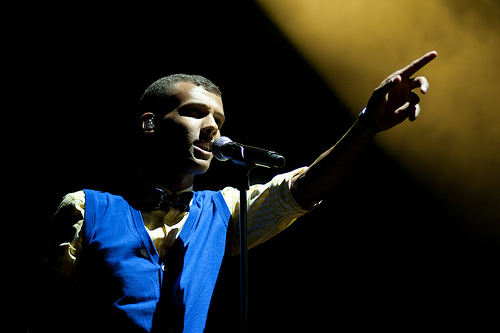
He is not just the figurehead of European hip hop and electronic music, but also an icon that especially young people seem to identify with. With socks pulled up to his knees, chequered shorts and a smirky grin on his face, he may remind you of a nerdy school kid, rather than a serious musician or even an artist! His song titles may seem pointless and his dance moves smell a bit like the early 2000s, but it’s on stage where it all comes together. The freaky appearance, songs like “Alors on dance” and the robo moves are all it takes to excite thousands of fans all across Europe. However, don’t let the first impressions fool you, because behind the masquerade is a serious artist, who will find inspiration in almost everything he sees and does! Like a song about “moules frites” or “Mussels and Fries”, a popular dish from his home country, Belgium.
But let’s start at the very beginning, Paul van Haver, who is better known as Stromae, was born in Brussels, Belgium as the son of Miranda Marie and his Rwandan father Dylann Steven. His father was mostly absent during his childhood and was killed during the 1994 Rwandan Genocide. At the age of 11, Stromae already showed an interest in music and attended ‘l’Académie Musicale de Jette’, where he studied music history and learned to play the drums. This was his first experience with music theory. At the age of 18 he founded a rap group called “Suspicion” along with rapper J.E.D.I. . After they had produced the song and music video “Faut que t’arrête le Rap…”, J.E.D.I. decided to leave the rap duo. In 2007 Stomae registered at “Institut national de radioélectricité et cinématographie”and released his first album “Juste un cerveau, un flow, un fond et un mic…”, which resulted in a 4 year record deal with “Because Music” and “Kîlomaitre”.
While working at a local ‘NRJ Radio’ station in 2009, Stromae released his first single ‘Alors on danse’ , and was immediately supported by the stations Music Manager, Vincent Verbelen, who decided to air his song for the first time on NRJ. By May 2010 the song had reached number one in more than 10 countries, including France, Germany, Italy and the Netherlands. “I was in a little group doing rap music. I thought that rather than copying the French sound, I’d focus on a more American style but give it a European spin. And then I rediscovered 90s Eurodance. For a long time we were ashamed of that sound but in fact there’s a lot to discover, it has its roots in everything from house to salsa”, he’s aid in an interview in 2010.
But to Stromae it’s not just about the music, it is about the message behind it! In each one of his songs he’s trying to express his feelings on specific topics, like peace or violence, homosexuality, relationships and so on… Some of his fans have even given him the rather unusual nickname “the misery muse”!
“Not because his songs have a depressing effect on you, but because you can identify yourself with the sadness and the pain and the hope in each one of them. He writes songs about relationships that went wrong and the painful process that you’re going through afterwards, then he simply adds a beat and a new song is created”, that’s how a fan describes his genius while referring to his latest creation “Tous les mêmes”
“The music is often playful but almost always cut through with a darker strain, a reflection of the disillusionment and restlessness that have supplanted the self-assurance of an earlier generation in Europe”, that’s how NY Times Author Scott Sayare explained his music.
Even though his life has changed because of his music, Stromae seems surprisingly down to earth and nothing like the rich snobs that he criticizes in his songs. “Life will never be the same again. People recognize me, that’s the first thing that changes in your life, that’s the first thing. Financially of course but not directly, you have to wait one year for your money (royalties). Your life changes so people around you change too and that’s just normal. You need to be in the same environment like at the beginning. You need your family your real friends your first friends.”
“The Story behind his name:
That’s « verlan » for maestro. Verlan is slang from Paris, but we use it in Brussels too. You take a word and flip it. Maestro becomes Stromae. I find it a bit more modest.
I don’t pretend I’m a maestro. I consider myself to be one just because I write songs behind my computer. My musicians are inside my computer. I’ll never compare myself to big composers like Mozart or Beethoven.”
A truly remarkable artist with a great understanding of the modern music industry!

